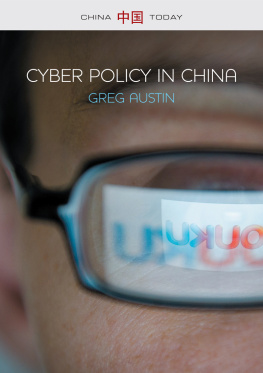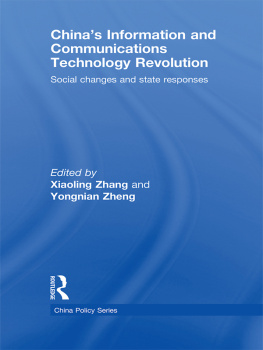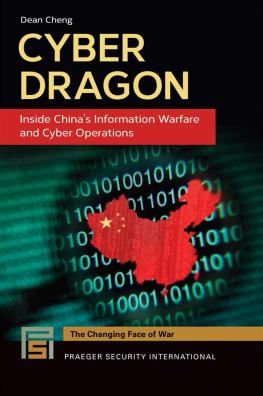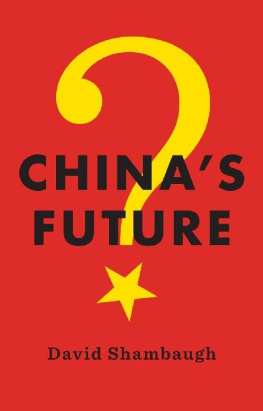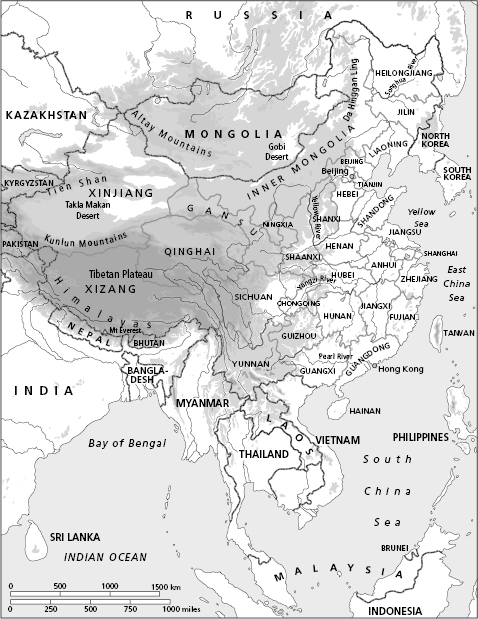
Table of Contents
China Today series
Stuart Harris China's Foreign Policy
Michael Keane Creative Industries in China
Pitman Potter China's Legal System
Xuefei Ren Urban China
Judith Shapiro China's Environmental Challenges
LiAnne Yu Consumption in China
Copyright Greg Austin 2014
The right of Greg Austin to be identified as Author of this Work has been asserted in accordance with the UK Copyright, Designs and Patents Act 1988.
First published in 2014 by Polity Press
Polity Press
65 Bridge Street
Cambridge CB2 1UR, UK
Polity Press
350 Main Street
Malden, MA 02148, USA
All rights reserved. Except for the quotation of short passages for the purpose of criticism and review, no part of this publication may be reproduced, stored in a retrieval system, or transmitted, in any form or by any means, electronic, mechanical, photocopying, recording or otherwise, without the prior permission of the publisher.
ISBN-13: 978-0-7456-6979-3
ISBN-13: 978-0-7456-6980-9 (pb)
ISBN-13: 978-0-7456-8588-5 (epub)
ISBN-13: 978-0-7456-8587-8 (mobi)
A catalogue record for this book is available from the British Library.
The publisher has used its best endeavours to ensure that the URLs for external websites referred to in this book are correct and active at the time of going to press. However, the publisher has no responsibility for the websites and can make no guarantee that a site will remain live or that the content is or will remain appropriate.
Every effort has been made to trace all copyright holders, but if any have been inadvertently overlooked the publisher will be pleased to include any necessary credits in any subsequent reprint or edition.
For further information on Polity, visit our website: www.politybooks.com
This book is dedicated to Angelica and Elvira.
Tables
Priorities of the NIP, 20062020
Nine ideal values for an information society
Start-up dates for public Chinese internet platforms, 19971999
Start-up dates for public Chinese internet platforms, 2000 onwards
Selected additional international policy milestones, 2000
Chronology
| 1911 | Chinese Republican Revolution and fall of the Qing dynasty |
| 1949 | Founding of the People's Republic of China (PRC) |
| 19503 | Korean War |
| 19537 | First Five-Year Plan; PRC adopts Soviet-style economic planning |
| 1954 | First constitution of the PRC and first meeting of the National People's Congress |
| 1957 | Anti-rightist campaign suppresses political criticism of Mao Zedong |
| 1958 | First Chinese computer built, based on designs from the USSR |
| 196676 | Great Proletarian Cultural Revolution; Mao reasserts power |
| 1976 | Mao dies; most universities reopen after ten years' closure |
| 1978 | Deng Xiaoping rises to power and launches the opening up, reform and four modernizations |
| 1983 | China accelerates investment in electronics industry |
| 1985 | Software Institute set up in the Chinese Academy of Sciences |
| 1986 | First email sent from China |
| 1987 | China commits to the goal of becoming an information economy |
| 1989 | Tiananmen Square protests culminate in 4 June military crackdown and suppression of the movement for science and democracy |
| 1990 | First Chinese-made PC launched in the domestic market |
| 1992 | US National Science Foundation rebuffs China's first request for public access to the internet; Deng Xiaoping's Southern Inspection Tour re-energizes economic reforms |
| 19932005 | Jiang Zemin takes Deng's place as paramount leader and continues economic growth agenda |
| 1994 | Competition in mobile phones introduced with establishment of Unicom |
| 1995 | Internet and world wide web come to the Chinese public |
| 1996 | State-owned Great Wall Technology Group set up |
| 1997 | Chinese telecoms companies part privatize on the New York Stock Exchange |
| 1998 | Ministry of Information Industry set up; Chinese web portals Sina and Sohu open |
| 1999 | China suppresses Falun Gong; China agrees tough terms that will enable it to join the World Trade Organization; Yahoo! in China; eBay clone EachNet set up |
| 2000 | Chinese Communist Party (CCP) general secretary Jiang Zemin commits China publicly to the goal of becoming an information society |
| 2002 | Microsoft is first foreign company admitted to China Software Association |
| 200212 | Hu Jintao is general secretary of the CCP and president of China from 2003 |
| 2003 | China changes military doctrine to emphasize informatization |
| 2005 | Sina launches a blog capability; first internet TV licence issued |
| 2006 | Long-term plan for national informatization to 2020 launched |
| 2008 | New super-ministry of industry and information technology is set up |
| 2009 | China bans Twitter and Skype |
| 2010 | China's armed forces set up a leading group on informatization |
| 2011 | Obama says United States is facing another Sputnik moment, referencing cyber espionage by China |
| 2012 | Reports of cyber surveillance of China's leaders by its own police; Xi Jinping is general secretary of the CCP, and president of China from 2013 |
| 2013 | New crackdown on anti-CCP information, the constitution movement and journalists |
| 2014 | Xi Jinping is first general secretary of CCP to take direct control of the leadership group on informatization, led since 2001 by the premier |
Preface
The internet came to the public in China in 1995. Twenty years later, China has the biggest population of netizens in the world; it has become the world's biggest producer of desktop computers; and two of its telecommunications equipment providers are among the world's largest. Is China on a pathway to dominance in cyberspace? It could be. Yet, as impressive as those few manifestations of China's digital prowess are, they can be viewed as part of a much bigger canvas the idea of an information society. This concept predates the creation of the internet by several decades and is defined by many features much more wide-ranging in scope than the sorts of measures just mentioned.
The idea of an information society evolved from an earlier concept of information economy or knowledge economy. In 1962, economist Fritz Machlup estimated for the first time the monetary value of knowledge production in the United States and how this form of production had transformed the economy (Machlup 1962). By the early 1970s, various commentaries on his work had elaborated on the concept of the knowledge economy and information economy, portending an information revolution every bit as transformative in social and political terms as the industrial revolution.
Next page
